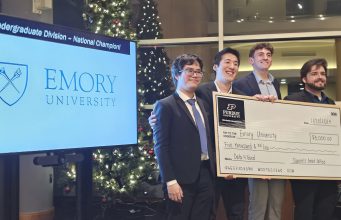
[highlight]The Goizueta Marketing Strategy Consultancy (GMSC)[/highlight], a cornerstone of experiential learning at Goizueta Business School, celebrated its 25th anniversary Thursday evening with the flair expected among those who appreciate good branding and storytelling.
“… We are here 25 years later to celebrate the spirit and drive that turned a spark of an idea in 1991 into a sustainable and enduring program that has become a strong differentiator for the school, a source of pride for alums, great value for our clients, and a model of success for expanding our experiential learning initiatives school wide and program wide,” said Reshma Shah, who was also honored for 20 years of leading the program.
“I couldn’t be more proud of what we have built together.”
Founded by a group of eager students, GMSC began as a marketing competition. In the past two decades, it has grown to encompass a class, group learning and real-life project scenarios brought to the MBA program by well-known companies across the globe.
[pullquote]”I couldn’t be more proud of what we have built together.” – Reshma Shah[/pullquote]
The program has become known for quality work and adaptability.
“This program is a living example of one of dad’s core beliefs,” said Javier Goizueta, son of the school’s namesake, Roberto C. Goizueta, and a vice president at The Coca-Cola Company. “That is teaching business the way it is going to be.”
“What I am most impressed with is GMSC’s ability to change and evolve to meet the needs of the marketplace,” added Karri Hobson-Pape, an alumna of the program and current Vice President of Marketing and Communications at the University of Georgia.
More than 150 alumni, company representatives, faculty, staff and friends attended the event. Near the end of the evening Shah noted the “GMSC Model” expansion to other areas of the curriculum. Lynne Segall, Associate Dean for Management Practice Initiatives said Goizueta students are currently working on 26 projects across disciplines.
“The future of GMSC will continue to be collaborative, but also interactive, real-world, real-time, evidence based and immersive,” Shah said. “These words characterize changes in the ways our models of learning are evolving.
“I often talk about the four I’s of the future of learning in higher education. In the future, education will need to become more individualized, interactive, international, and interconnected. With properly structured experiential learning initiatives, we can better align our offerings to the evolving needs of students and models of delivering education to meet those needs.”










